7AUnit2知识点归纳
- 格式:doc
- 大小:50.50 KB
- 文档页数:3
![[译林版]7A Unit2 Let us play sports讲义](https://uimg.taocdn.com/ba844545ee06eff9aef807b1.webp)
7A Unit2 Let us play sports讲义一.重点短语Hope to do sth 希望做某事 many times a day 一天多次 play+球类打......(play volleyball 打排球)Live in +地点住在......(live in nan jing 住在南京) free time 空闲时间 come true 成为现实At weekends 在周末 make sb do sth 使某人做某事 make me feel great 使我感觉很棒 a music club 一个音乐俱乐部 talk about =talk of 谈论...... a member of ......的一员 of course 当然二.重点句型,语法1.I walk to my bowl many times a day. 我每天都往我的饭碗那儿走好多次。
walk to ......意为步行去......,to后接地点,如果后面接副词,to可以省略。
相当于go to......on foot. Eg:He walks there at five.他五点步行去那儿。
I walk to school every day.= 我每天步行上学。
一般现在时1.表示经常或习惯性的动作She watchs TV on saturdays.2.表示客观事实。
Cats eat fish. 猫吃鱼3.表示现在的状态或主语具备的性格能力。
Simon likes playing football.西蒙喜欢踢足球。
I am a English teacher.我是一个英语老师。
注:一般现在时中,当主语是第三人称单数时,动词要用“三单形式”,其他人称用动词原形。
4.含有实义动词的一般现在时态的句子转换。
(1)动词原形肯定句:We have lessons from Monday to Friday.否定句:We do not have lessons from Monday to Friday.一般疑问句:Do you have lessons from Monday to Friday?肯答:Yes,we do. 否答:No, we do not.(2)动词三单形式肯定句:He swims in summer.否定句:一般疑问句:肯答:否答:三.练习提高A.英汉互译。
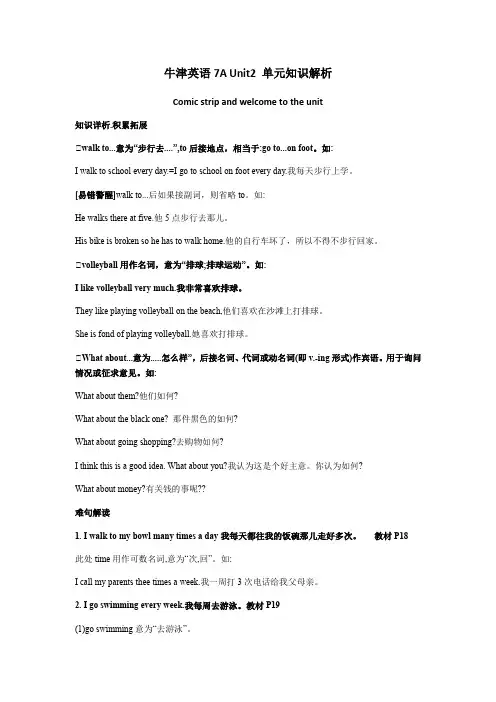
牛津英语7A Unit2 单元知识解析Comic strip and welcome to the unit知识详析.积累拓展➊walk to...意为“步行去....”,to后接地点,相当于:go to...on foot。
如:I walk to school every day.=I go to school on foot every day.我每天步行上学。
[易错警醒]walk to...后如果接副词,则省略to。
如:He walks there at five.他5点步行去那儿。
His bike is broken so he has to walk home.他的自行车坏了,所以不得不步行回家。
❷volleyball用作名词,意为“排球;排球运动”。
如:I like volleyball very much.我非常喜欢排球。
They like playing volleyball on the beach,他们喜欢在沙滩上打排球。
She is fond of playing volleyball.她喜欢打排球。
❸What about...意为.....怎么样”,后接名词、代词或动名词(即v.-ing形式)作宾语。
用于询问情况或征求意见。
如:What about them?他们如何?What about the black one? 那件黑色的如何?What about going shopping?去购物如何?I think this is a good idea. What about you?我认为这是个好主意。
你认为如何?What about money?有关钱的事呢??难句解读1. I walk to my bowl many times a day我每天都往我的饭碗那儿走好多次。
教材P18此处time用作可数名词,意为“次,回”。
如:I call my parents thee times a week.我一周打3次电话给我父母亲。
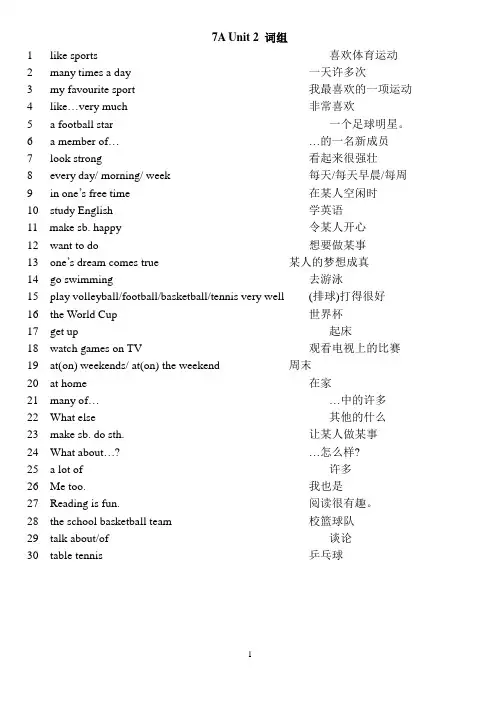
7A Unit 2 词组1 like sports 喜欢体育运动2 many times a day 一天许多次3 my favourite sport 我最喜欢的一项运动4 like…very much 非常喜欢5 a football star 一个足球明星。
6 a member of……的一名新成员7 look strong 看起来很强壮8 every day/ morning/ week 每天/每天早晨/每周9 in one’s free time 在某人空闲时10 study English 学英语11 make sb. happy 令某人开心12 want to do 想要做某事13 one’s dream comes true 某人的梦想成真14 go swimming 去游泳15 play volleyball/football/basketball/tennis very well (排球)打得很好16 the World Cup 世界杯17 get up 起床18 watch games on TV 观看电视上的比赛19 at(on) weekends/ at(on) the weekend 周末20 at home 在家21 many of……中的许多22 What else 其他的什么23 make sb. do sth. 让某人做某事24 What about…? …怎么样?25 a lot of 许多26 Me too. 我也是27 Reading is fun. 阅读很有趣。
28 the school basketball team 校篮球队29 talk about/of 谈论30 table tennis 乒乓球1。
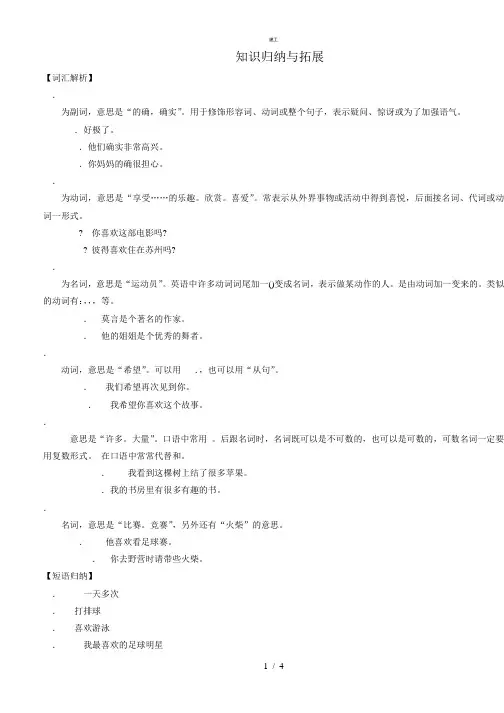
知识归纳与拓展【词汇解析】.为副词,意思是“的确,确实”。
用于修饰形容词、动词或整个句子,表示疑问、惊讶或为了加强语气。
.好极了。
.他们确实非常高兴。
.你妈妈的确很担心。
.为动词,意思是“享受……的乐趣。
欣赏。
喜爱”。
常表示从外界事物或活动中得到喜悦,后面接名词、代词或动词一形式。
? 你喜欢这部电影吗?? 彼得喜欢住在苏州吗?.为名词,意思是“运动员”。
英语中许多动词词尾加一()变成名词,表示做某动作的人。
是由动词加一变来的。
类似的动词有:,,,等。
.莫言是个著名的作家。
.他的姐姐是个优秀的舞者。
.动词,意思是“希望”。
可以用.,也可以用“从句”。
.我们希望再次见到你。
.我希望你喜欢这个故事。
.意思是“许多。
大量”。
口语中常用。
后跟名词时,名词既可以是不可数的,也可以是可数的,可数名词一定要用复数形式。
在口语中常常代替和。
.我看到这棵树上结了很多苹果。
.我的书房里有很多有趣的书。
.名词,意思是“比赛。
竞赛”,另外还有“火柴”的意思。
.他喜欢看足球赛。
.你去野营时请带些火柴。
【短语归纳】.一天多次.打排球.喜欢游泳.我最喜欢的足球明星.黄河足球俱乐部的一名新成员.居住在北京.看起来强壮.在他的空闲时间里.使他开心.’在下一届世界杯.’成为现实.在电视上观看球类比赛.在周末.使我感觉很棒.读许多有趣的书.拿这个包.一个音乐俱乐部.和我的朋友们一起打篮球.谈论篮球【句型分析】..() 我希望他的梦想成真。
这句话中的是及物动词,在句中充当宾语,此句中后面省略了。
此外,还可接不定式.。
要注意的是,我们只说:.,不说..。
另外,也可以用作名词,意为“希望,期望”。
() .我期望他会成功。
.我期待不久能见到你和你的家人。
’.你一定不要放弃希望。
.你是我唯一的希望。
【拓展】关于我们还有一个常用句型,.希望如此。
..一.()当然。
我经常……通常在对话中用作回答,表示“当然”。
一? 你和我们一起去吗?一.当然啦。
有时与连用。
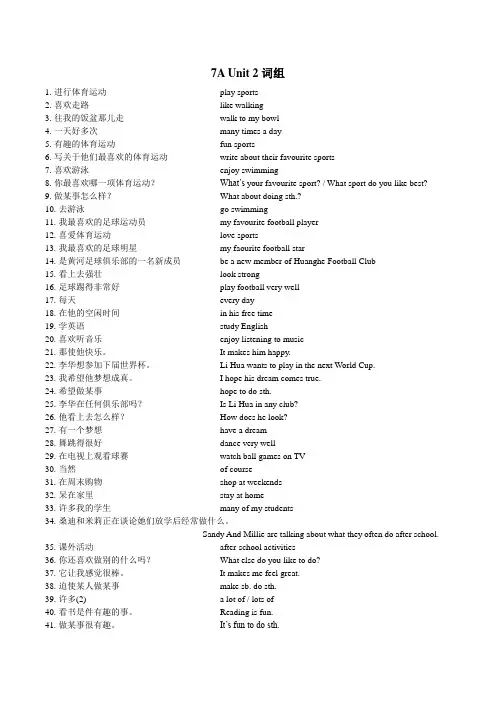
7A Unit 2词组1.进行体育运动play sports2.喜欢走路like walking3.往我的饭盆那儿走walk to my bowl4.一天好多次many times a day5.有趣的体育运动fun sports6.写关于他们最喜欢的体育运动write about their favourite sports7.喜欢游泳enjoy swimming8.你最喜欢哪一项体育运动?What’s your favourite sport? / What sport do you like best?9.做某事怎么样?What about doing sth.?10.去游泳go swimming11.我最喜欢的足球运动员my favourite football player12.喜爱体育运动love sports13.我最喜欢的足球明星my faourite football star14.是黄河足球俱乐部的一名新成员be a new member of Huanghe Football Club15.看上去强壮look strong16.足球踢得非常好play football very well17.每天every day18.在他的空闲时间in his free time19.学英语study English20.喜欢听音乐enjoy listening to music21.那使他快乐。
It makes him happy.22.李华想参加下届世界杯。
Li Hua wants to play in the next World Cup.23.我希望他梦想成真。
I hope his dream comes true.24.希望做某事hope to do sth.25.李华在任何俱乐部吗?Is Li Hua in any club?26.他看上去怎么样?How does he look?27.有一个梦想have a dream28.舞跳得很好dance very well29.在电视上观看球赛watch ball games on TV30.当然of course31.在周末购物shop at weekends32.呆在家里stay at home33.许多我的学生many of my students34.桑迪和米莉正在谈论她们放学后经常做什么。
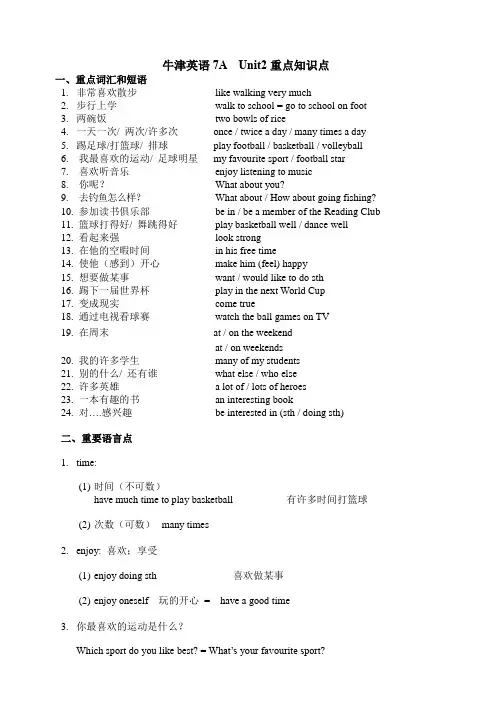
牛津英语7A Unit2重点知识点一、重点词汇和短语1.非常喜欢散步like walking very much2.步行上学walk to school = go to school on foot3.两碗饭two bowls of rice4.一天一次/ 两次/许多次once / twice a day / many times a day5.踢足球/打篮球/ 排球play football / basketball / volleyball6.我最喜欢的运动/足球明星my favourite sport / football star7.喜欢听音乐enjoy listening to music8.你呢?What about you?9.去钓鱼怎么样?What about / How about going fishing?10.参加读书俱乐部be in / be a member of the Reading Club11.篮球打得好/舞跳得好play basketball well / dance well12.看起来强look strong13.在他的空暇时间in his free time14.使他(感到)开心make him (feel) happy15.想要做某事want / would like to do sth16.踢下一届世界杯play in the next World Cup17.变成现实come true18.通过电视看球赛watch the ball games on TV19.在周末at / on the weekendat / on weekends20.我的许多学生many of my students21.别的什么/还有谁what else / who else22.许多英雄 a lot of / lots of heroes23.一本有趣的书an interesting book24.对….感兴趣be interested in (sth / doing sth)二、重要语言点1.time:(1)时间(不可数)have much time to play basketball 有许多时间打篮球(2)次数(可数)many times2.enjoy: 喜欢;享受(1)enjoy doing sth 喜欢做某事(2)enjoy oneself玩的开心= have a good time3.你最喜欢的运动是什么?Which sport do you like best? = What’s your favourite sport?4.make:(1)制作make a kite 制作风筝(2)使某人….make sb happy 使某人高兴5.want = would like 想要…want / would like sth / to do sth 想做某事6.hope: v.希望(1)hope to do sthEg. I hope to go to Beijing.我希望去北京。
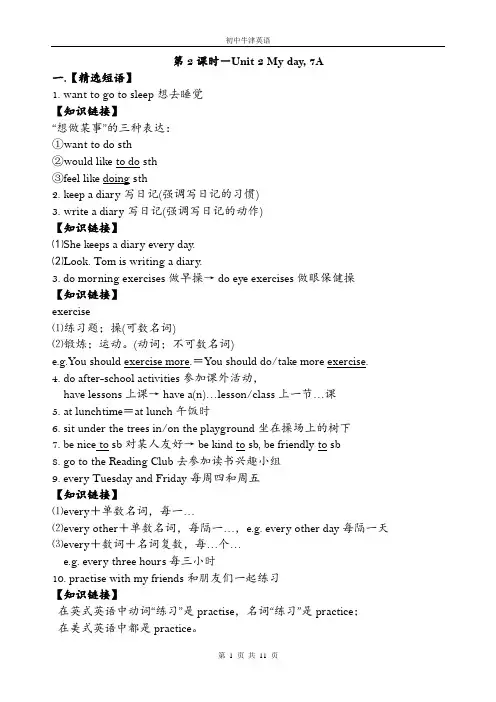
第2课时-Unit 2 My day, 7A一.【精选短语】1. want to go to sleep想去睡觉【知识链接】“想做某事”的三种表达:①want to do sth②would like to do sth③feel like doing sth2.keep a diary写日记(强调写日记的习惯)3.write a diary写日记(强调写日记的动作)【知识链接】⑴She keeps a diary every day.⑵Look. Tom is writing a diary.3. do morning exercises做早操→ do eye exercises做眼保健操【知识链接】exercise⑴练习题;操(可数名词)⑵锻炼;运动。
(动词;不可数名词)e.g.You should exercise more.=You should do/take more exercise.4.do after-school activities参加课外活动,have lessons上课→have a(n)…lesson/class上一节…课5.at lunchtime=at lunch午饭时6. sit under the trees in/on the playground坐在操场上的树下7. be nice to sb对某人友好→ be kind to sb, be friendly to sb8. go to the Reading Club去参加读书兴趣小组9. every Tuesday and Friday每周四和周五【知识链接】⑴every+单数名词,每一…⑵every other+单数名词,每隔一…,e.g. every other day每隔一天⑶every+数词+名词复数,每…个…e.g. every three hours每三小时10. practise with my friends和朋友们一起练习【知识链接】在英式英语中动词“练习”是practise,名词“练习”是practice;在美式英语中都是practice。
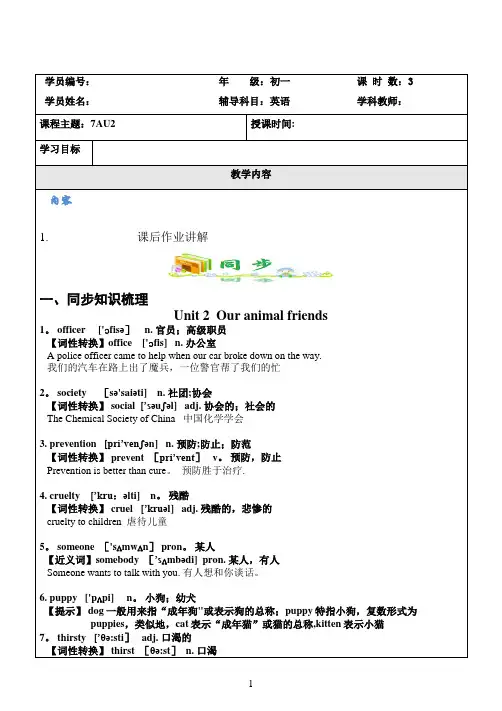
学员编号:年级:初一课时数:3 学员姓名:辅导科目:英语学科教师:课程主题:7AU2 授课时间:学习目标教学内容内容1.课后作业讲解一、同步知识梳理Unit 2 Our animal friends1。
officer ['ɔfisə] n. 官员;高级职员【词性转换】office ['ɔfis] n. 办公室A police officer came to help when our car broke down on the way.我们的汽车在路上出了魔兵,一位警官帮了我们的忙2。
society [sə'saiəti] n. 社团;协会【词性转换】 social [’səuʃəl] adj. 协会的;社会的The Chemical Society of China 中国化学学会3. prevention [pri’venʃən] n. 预防;防止;防范【词性转换】 prevent [pri’vent] v。
预防,防止Prevention is better than cure。
预防胜于治疗.4. cruelty [’kru:əlti] n。
残酷【词性转换】 cruel [’kruəl] adj. 残酷的,悲惨的cruelty to children 虐待儿童5。
someone ['sʌmwʌn] pron。
某人【近义词】somebody [’sʌmbədi] pron. 某人,有人Someone wants to talk with you. 有人想和你谈话。
6. puppy ['pʌpi] n。
小狗;幼犬【提示】 dog一般用来指“成年狗"或表示狗的总称;puppy特指小狗,复数形式为puppies,类似地,cat表示“成年猫”或猫的总称,kitten表示小猫7。
thirsty [’θə:sti] adj. 口渴的【词性转换】 thirst [θə:st] n. 口渴2. prefer意为“更喜欢”,当用的形式有:① prefer to do sth。
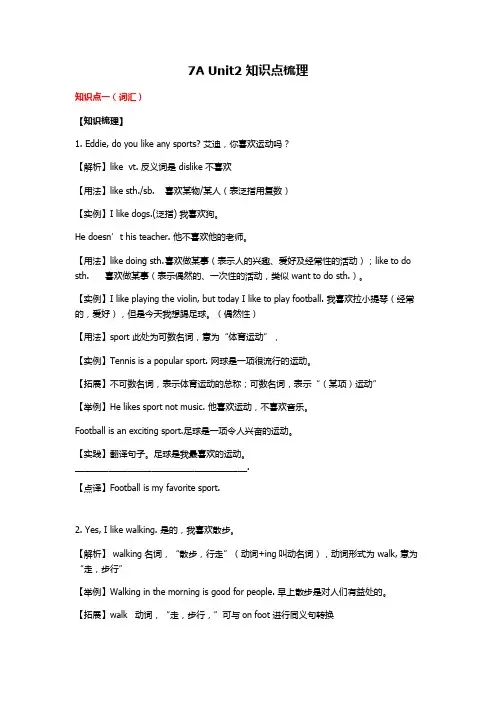
7A Unit2 知识点梳理知识点一(词汇)【知识梳理】1. Eddie, do you like any sports? 艾迪,你喜欢运动吗?【解析】like vt. 反义词是 dislike 不喜欢【用法】like sth./sb. 喜欢某物/某人(表泛指用复数)【实例】I like dogs.(泛指) 我喜欢狗。
He doesn’t his teacher. 他不喜欢他的老师。
【用法】like doing sth. 喜欢做某事(表示人的兴趣、爱好及经常性的活动);like to do sth. 喜欢做某事(表示偶然的、一次性的活动,类似 want to do sth.)。
【实例】I like playing the violin, but today I like to play football. 我喜欢拉小提琴(经常的,爱好),但是今天我想踢足球。
(偶然性)【用法】sport 此处为可数名词,意为“体育运动”,【实例】Tennis is a popular sport. 网球是一项很流行的运动。
【拓展】不可数名词,表示体育运动的总称;可数名词,表示“(某项)运动”【举例】He likes sport not music. 他喜欢运动,不喜欢音乐。
Football is an exciting sport.足球是一项令人兴奋的运动。
【实践】翻译句子。
足球是我最喜欢的运动。
____________________________________.【点译】Football is my favorite sport.2. Yes, I like walking. 是的,我喜欢散步。
【解析】 walking 名词,“散步,行走”(动词+ing叫动名词),动词形式为 walk, 意为“走,步行”【举例】Walking in the morning is good for people. 早上散步是对人们有益处的。
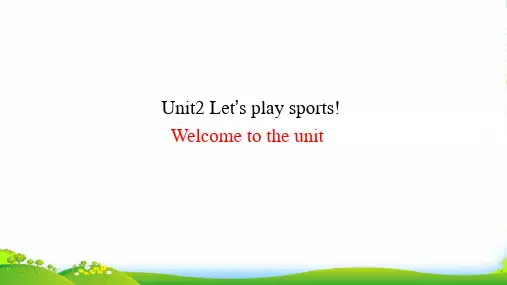
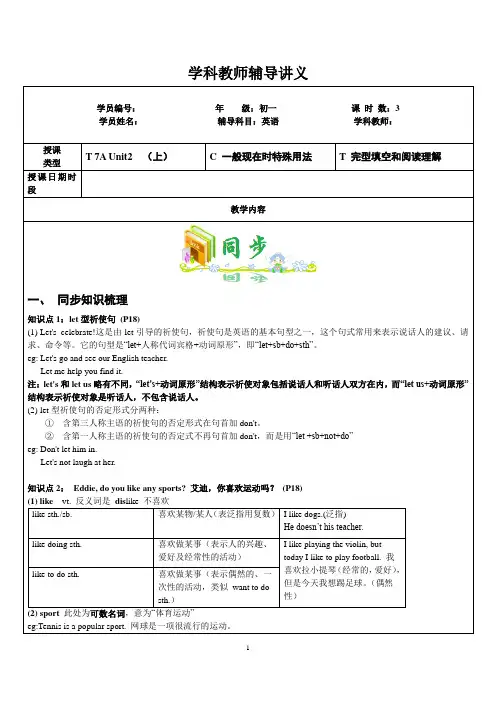
7A Unit 2 My day【单元学习重点和要求】一、语音1.单词重读` cartoon `favourite `principal `badminton`practise `swimming `playground `modeltech`nology mu`seum ac`tivities infor`mation2.不完全爆破a(c)tivities frien(d)ship the Grea(t) Wall bi(g) trees the firs(t) prize 3.句子重音和语调Can I `borrow your ↗pen?Do you `have your ↗books?May I `watch ↗TV?Is she `tall and ↗slim?Are you ↗busy?Do you `like ↗music?二、词汇1.单词assembly activities playground snack tuck principal practise swimmer favourite model badminton cartoon information technology museum swimming organizing price trip slim 2.词组it‟s time for+名词是做某事的时间了,该做某事了get up 起床after-school activities 课外活动have assembly 开晨会have lessons 上课eat breakfast/lunch/supper 吃早/中/晚餐do one‟s homework做家庭作业watch TV 看电视go to bed 上床睡觉keep a diary 记日记a day at school 在学校的一天lots of 许多;大量have fun 娱乐,乐趣;开心more than 多于;超过twice a week 一星期两次swimming club 游泳俱乐部read comic books 看连环漫画书have (no) time to do sth. 有(没有)时间做某事chat with sb 和某人聊天/闲谈go swimming 去游泳I would like to+动词原形愿意干某事;想要干某事from...to…从……到……look forward to…期盼;盼望turn on 打开(电灯、电视、收音机等)Here it is! 给你!三、日常用语Is it time for breakfast? 是吃早饭的时候了吗?What are you going to do today? 今天你打算干什么?Please e-mail me soon! 请尽快给我发电子邮件!We are in Class 1, Grade 7. 我们在七年级一班。
“ (牛津版 7A Unit 2 知识点讲解知识点一】1. Eddie, do you like any sports? 艾迪,你喜欢运动吗?①like vt. 反义词是 dislike 不喜欢 like sth./sb.喜欢某物/某人(表泛指用复数)I like dogs.(泛指)He doesn ’t his teacher .like doing sth. 喜欢做某事(表示人的兴趣、爱好及经常性的活动) like to do sth.喜欢做某事(表示偶然的、一次性 的活动,类似 want to do sth.)I like playing the violin, but today I like to play football. 我喜欢拉小提 琴(经常的,爱好) 但是今天我想 踢足球。
(偶然性)②sport 此处为可数名词,意为“体育运动”, T ennis is a popular sport. 网球是一项很流行的运动。
sport不可数名词,表示体育运动的总称 He likes sport not music. 他喜欢运动,不 喜欢音乐。
可数名词,表示“(某项)运动”Football is an exciting sport.足球是一项 令人兴奋的运动。
【经典习题】1.你喜欢什么体育运动吗? ?2.She likes (swim),but today she likes(go )hiking.【知识点二】 Yes, I like w alking . 是的,我喜欢散步。
walking 名词, 散步,行走” 动词+ing 变成名词,也叫动名词),动词形式为 walk, 意 为“走,步行”Walking in the morning is good for people. 早上散步是对人们有益处的。
walk动词,“走,步行,”可与 on foot 进行 同义句转换He walks to school every day .= He goes to school on foot every day .可数名词,“走,步行”,尤指为娱乐或 tak e/have a walk 散步,运动所做的的“散步”,常构成短语go for a walk 去散步go out for a walk 出去散步【经典习题】1. 我不是每天在晚饭后带我的狗散步 I don ’t tak e my dog for after supper everyday .2. I o ften go to school on foot (同义句转换)。
新译林7A英语UNIT2单元知识点归纳及练习题Unittwo一、词汇知识点整理:playsports做运动manytimesaday一天许多次playfootball/tennis踢足球/打网球talkabout谈论afterschool放学后inone’liveinalotofonTVIenjoyswimming.What’syourfavouritesport?我喜欢游泳,他最喜欢的运动是什么?Ihopehisdreamcomestrue.我希望他梦想成真。
WhatdoesLiHuadoinhisfreetime?李华在业余时间做什么?Whatelsedoyouwanttodo?你还想做什么其他的事情?Readingisfun.读书是有趣的事情。
四、语法归纳:行为动词的一般现在时行为动词的一般现在时的构成:主语+行为动词+(其他)当主语为第三人称单数(he,she,it)时,谓语动词也要用单数形式。
用好一般现在时,时间状态需牢记;主语人称是三单,动词要把-s/-es添;基本用法要记清,状态习惯经常性。
行为动词的一般现在时的变化1.否定句:主语+don’t/doesn’t+动词原形+其他Idon’tlikebread.Hedoesn’toftenplayfootball.2.一般疑问句:Do/Does+主语+动词原形+其他Doyouoftenplayfootball?Yes,Iam/No,Iamnot Doesheoftenplayfootball?Yes,hedoes/No,hedoesn’t3、特殊疑问句:特殊疑问句+一般疑问句?Whendoyougotoschool?Igotoschoolatseveno’clock.动词的三单形式的变化:一、单项选择。
(15分)()1.YaoMingisagood________player.Wealllikehim.A.footballB.volleyballC.basketballD.badminton. ()2.-_______isyourbrother?-Heisthirteen.A.HowB.WhatC.WhoD.Howold()3.Afterschoolmycousin________withDavid.A.walktohomeB.walkhomeC.walkstohomeD.walkshome ()4.Doeshe_______abustoschool?A.byeC.takeD.on()5._______you_______yournewschool?A.Is;likeB.Are;likeC.Does;likeD.Do;like()6.-Whatsportdoyoulikebest?-_________.A.Reading.B.SwimmingC.SingingD.Cooking()7.Thegirl_______longhair.She______watchinggamesintheevening.A.have;likeB.has;likeC.have;likesD.has;likes()8.-_______aretheboysandgirls?-Theyareintheplayground.A.WhatB.HowC.HowmanyD.Where()9.MytwinbrotherJohn______TVfromMondaytoFriday.A.notwatchB.don’twatchC.doesn’twatchD.watch()13-贝克汉姆()3.A.withB.forC.andD.to()4.A.friendlyB.goodC.helpfulD.bad()5.A.volleyballB.basketballC.footballD.tennis()6.A.studentB.memberC.teacherD.friend()7.A.seesB.watchesC.readsD.looksat()8.A.seldomB.neverC.notD.often()9.A.haveB.hasC.isD.are()10.A.doesB.playsC.borrowsD.gets三、阅读理解。
牛津7A知识重点Unit 2Welcome1.real adj. ---- really adv..a real car一辆真车. I am really sorry.我真的抱歉。
.true adj.a true story一个真实的故事. a true story about a real person真人真事2.walk to my bowl = go to my bowl on foot走到我的碗那儿去.ride(a bike) to school = go to school by bike= go to school on a bike 3. I walk to my bowl many times a day.(提问)---- How often do you walk to your bowl?.I go swimming every week. (提问)---- How often do you go swimming?4.球类、棋类运动不加the.play volleyball/ basketball/ tennis/ table tennis/ football/badminton . play (Chinese) chess注意:play with a ball玩球西洋乐器加the.play the piano/ violin5. be good at / do well in +doing…. like/ love/ enjoy +doing…6.What’s your favourite sport?你最喜欢的运动是什么?= What sport do you like best?7.What/ How about+ sth. ?What about some milk?来些牛奶怎么样?What/ How about+doing sth?What about doing some shopping?购物怎么样?What/ How about+ 代词宾格?What about them?他们呢?. ex.My dog is yellow. What about ____________ (you)?Reading1.my favourite foot ball player 我最喜欢的足球选手one’s favourite…某人最喜爱的。
7A Unit2知识梳理一、同步知识梳理知识点1:let型祈使句(P18)(1)Let's celebrate!这是由let引导的祈使句,祈使句是英语的基本句型之一,这个句式常用来表示说话人的建议、请求、命令等。
它的句型是“let+人称代词宾格+动词原形”,即“let+sb+do+sth”。
eg: Let's go and see our English teacher.Let me help you find it.注:let's和let us略有不同,“let's+动词原形”结构表示祈使对象包括说话人和听话人双方在内,而“let us+动词原形”结构表示请求对方允许自己(第一人称复数)做某事时,这里的us 不包含听话人在内,不能缩写。
(2)let型祈使句的否定形式分两种:①含第三人称主语的祈使句的否定形式在句首加don't。
②含第一人称主语的祈使句的否定式不再句首加don't,而是用“let +sb+not+do”eg: Don't let him in.Let's not laugh at her.知识点2:Eddie, do you like any sports? 艾迪,你喜欢运动吗?(P18)(1) like vt. 反义词是dis like 不喜欢(2) sport此处为可数名词,意为“体育运动”eg:Tennis is a popular sport. 网球是一项很流行的运动。
知识点3:Yes, I like walking. 是的,我喜欢散步。
(P18)walking 名词,“散步,行走”(动词+ing 变成名词,也叫动名词),动词形式为walk, 意为“走,步行”eg:Walking in the morning is good for people.知识点4:really adv. (副词) 实际上,事实上;My father didn't really love her. 我爸爸实际上并不爱她。
一重点词语1.wake up 醒来2.have fun doing sth 做某事有乐趣have a good time / enjoy oneself doing sth 做某事有乐趣be full of fun 充满乐趣make fun of sb 同某人开玩笑,取笑(嘲笑)某人3. a five-year-old boy 一个五岁的男孩a boy of five years old 一个五岁的男孩4.take / have a walk 散步talk walks 散步go (out) for a walk 出去散步5.an hour 一小时half an hour 半小时one hour and a half 一个半小时one and a half hours 一个半小时6.at first 起初最初first of all 首先最重要的是from first to last 自始至终一贯7.be good at / be clever at / do well in doing ……擅长做某事be good for sb / sth 对……有益be good to sb 对某人好(和善,关爱)8.do one’s lessons 做功课have an English lesson 上一堂英语课give / teach sb a lesson 给某人一个教训learn one’s lesson 吸取教训9.be pleased with sb 对某人感到满意be pleased at sth 对某事感到高兴或满意10.want to do sth 想要干某事would like to do sth 想要干某事feel like doing sth 想要干某事11.do morning / eyes exercises 做早(眼保健)操12.do after-school activities 进行课外活动13.chat with each other 相互闲聊14.spend time / money on sth / (in)doing sth 花费时间/金钱做某事15.send an e-mail to sb 给某人发电子邮件16. a member of the Swimming Club 游泳俱乐部的成员be in the Swimming Club 游泳俱乐部的成员17.practice doing sth 练习做某事18.twice a week 一周两次19.in the newspaper 在报纸上20.all the time 一直,总是21.meet up with sb 与某人相约22.know a lot about computers 精通电脑23.go to the dancing lesson 去上舞蹈课24.be busy with / doing sth 忙于做某事25.have much time to do sth 有很多时间做某事26.say hello / goodbye to sb 向某人问好/道别27.go on a study-trip 进行一次学习旅行28.on each side of the street 在街道的每一边29.thank sb for doing sth 感谢某人做某事30.the price for ……。
Unit 2 短语1.play sports 做运动2.enjoy/like/love doing 喜欢做3.like walking/ running/swimming/drawing4.walk to school=go to school on foot5.walk home/walk here/walk there/=go home on foot6.once a day/一天两次twice a day/three times a day7.play football/volleyball8.play games/play computer games9.fly kites/fly a kite10.go swimming/go fishing/go shopping11. be a member of …=be in …12. English Club/Swimming Club/ Dancing Club13.联系动词smell/taste/sound/feel/look/become+形容词14.play football well=be good at playing football=be a good football player15.in one’s free time16.make him happy/sad (使某人怎样make sb +形容词)17.make sb do sth/make sb not do sth)18.want to do sth19.What else do you like to do?= What other things do you like to do? 你还喜欢做什么事情20.talk about how to learn English谈论如何学英语21.talk about 谈论/talk with sb和某人谈论/talk about …with sb 和某人谈论…22.go walking = go for a walk去散步23.play in the next World Cup参加下届世界杯24.watch ball games on TV 在电视上看比赛25.My dream is to do sth.我的梦想是做某事26.dream of/dream about doing sth梦想做某事27.遛狗walk a dog28.one of my favourite heroes我最喜欢的英雄之一e true实现30.hope to do sth/ hope +that 从句(I hope that I can/wil…)31.What about doing sth?/What about going fishing?32.stay at home33.a hero/ two hero es34.of course=sure=certainlyUnit 2句型转换1. every morning.every morning.2.Is your friend from England?==Does your friend come from England?3.Amy takes a bus to work in the morning.(对交通方式提问)How does Amy go to work in the morning?4.My brother walks to school every day.How does your brother go to school every day?5.His parents have sports every day. (对干某事提问)What do his parents do every day?6.Simon does his homework in his bedroom.What does Simon do in his bedroom?7.8.Mary plays basketball every week.does Mary play basketball?9.Tom plays football at weekends /on Monday/in the afternoon.When does Tom play football?10.★How many times a week11.★Peter goes to dancing classes three times a week.How often does Peter go to dancing classes?12.Mr and Mrs Green like reading very much.(对主语提问,who是三单)Who likes reading very much?13.Bill often flies kites in the park.●14.Mike enjoys dancing .●What does Mike enjoy doing?15.I like music. ●What do you like?16.It makes him happy. 这使得他很开心。
Listening to music makes him happy. (动名词作主语,谓语动词用三单)Playing computer games makes him busy .(忙碌的adj.)★make的用法: 1. make sb. adj. 使某人处于某种状态(形容词补充说明宾语sb.的状态,作宾语补足语,简称“宾补”)②make sb do sth使、让某人做某事(do sth.也作宾补,用动词原形,类似用法:let sb. do sth.)Listening to music makes him feel happy.17.I hope his dream comes true. 我希望他梦想成真。
(动词hope后面的宾语是一个句子his dream comes true,简称“宾语从句”。
)★动词hope的常考用法:①hope+句子(句中动词填空常用将来时:will+动词原形,可记忆成:hope sb. willdo…或包含情态动词。
)I hope he will come to my birthday party. 我希望他会来参加我的生日聚会。
②hope to do sth.I hope to be a pop singer like Liang Bo. 我希望成为像梁博一样的流行歌手。
18. dream 梦想n. My dream is to be a basketball player like Yao Ming.(动词不定式“to+动词原形”在be动词后作表语)19.help sb. with sth. 在某方面帮助某人help sb. (to) do sth. 帮助某人做某事I’m not good at Maths. My friends often helps me with it.我不擅长数学。
我的朋友经常帮助我She often helps her mother do some housework at weekends. 她经常在周末帮妈妈干家务。
形容词adj. : helpful 乐于助人的He is a helpful boy. He always helps people in need.他是一个乐于助人的男孩。
他总是帮助需要帮助的人。
20.What else do you like to do? 你还喜欢做哪些别的事情?★else“别的,其他的”常放在特殊疑问词和不定代词后Where else would you like to go? 你还想去哪些别的地方?Do you have anything else to say? 你还有什么别的话要说?21.Reading is fun. 看书是有趣的事。
(英语中动词原形不能直接做主语,可将动词后加ing形式变为动名词做主语)Watching TV is one of my hobbies. 看电视是我的爱好之一。
★fun有趣的事不可数名词常考用法:①It is fun to do sth. It is fun to skate on real ice. 在真正的冰上溜冰是有趣的事。
②have fun doing sth.. We have fun singing and dancing in the park. 我们在公园唱啊跳啊玩得很开心。
22.take 带走(take …to…把…..从说话的人那儿带到别的地方去,可与away,there连用)bring 带来(bring….to….把…..从别的地方带到说话的人这儿来,可与me ,here 连用)You can’t put the books here. Please take them away. 你不能把书放在这儿。
请把它们拿走。
Would you please bring me a cup of tea? 请帮我拿杯咖啡来好吗?23.I like basketball very much. (提问:问程度用How :How do you like basketball?)24.He is my hero. 他是我的偶像。
Yao Ming is one of my heroes. 姚明是我的偶像之一。
25.Does your cousin study English at home?(改为陈述句)26.Do they like stories?They like stories.。